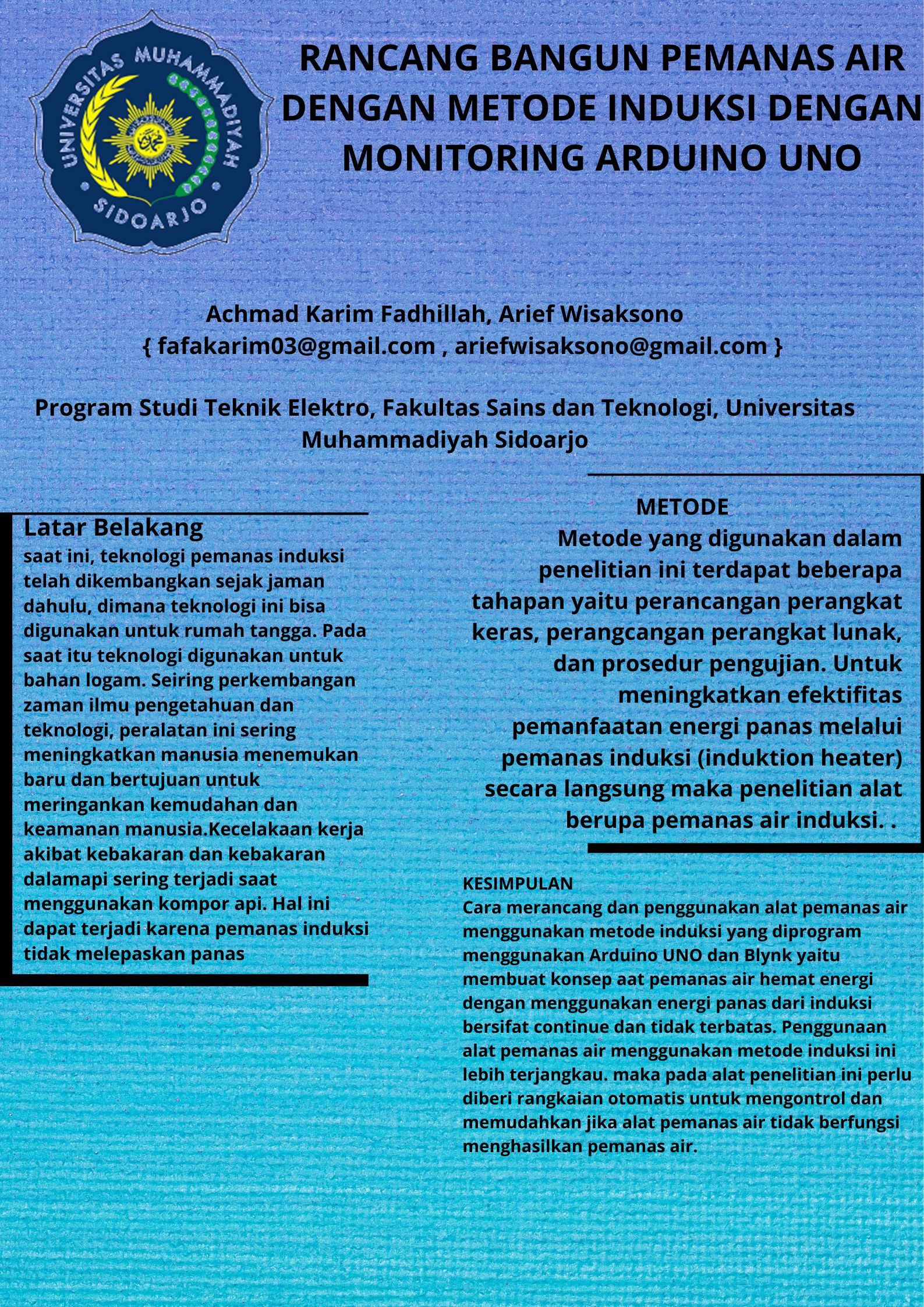Design and Construction of Water Heater with Induction Method with Arduino Uno Monitoring
Rancang Bangun Pemanas Air Dengan Metode Induksi Dengan Monitoring Arduino Uno
DOI:
https://doi.org/10.21070/pels.v2i2.1295Keywords:
Arduino UNO, Blynk, Induction Heater, Ds18b20Abstract
Induction heating is a process in which the heater and the object to be heated are not in physical contact. Therefore, several previous studies did not provide information about the effect of winding and coil diameter on the performance of induction heaters. The sensor used is the Ds18b20 sensor which detects the temperature of hot water and cold water. To increase the effectiveness of the use of heat energy through an induction heater directly, the research tool is an induction water heater. Induction heating is the generation of heat in a metal exposed to an induced magnetic field. In this process, a validated graphic temperature controller is invaluable through the monitoring process using software that can detect the hot temperature of the Blynk and 16X2 LCD. The hot water temperature generated by the induction heater allows the system to operate optimally. As a result, the capillary tube reaches a hot temperature and a constant water temperature of 38 ° C in 173 seconds. The microcontroller and flash connection detection test is working fine. This system makes it easy to carry out the temperature monitoring process via a smartphone.
Downloads
References
D. S. Wulandari, M. R. Kirom, T. A. Ajiwiguna, F. T. Elektro, and U. Telkom, “Rancang Bangun Dan Implementasi Sistem Pemanas Air Design and Implementation Controlled Water Heater System Based Thermoelectric,” pp. 1–8, 2016.
D. A. N. A. Uno, “SISTEM KONTROL PEMANAS AIR MENGGUNAKAN SENSOR ULTRASONIK,” vol. 9, no. 2, pp. 30–35, 2020.
M. H. Frendy Karnes Sitepu Dr. Wilsa, S.H, M.H. Zuleha, S.H., “EFEKTIFITAS PENGGUNAAN HELM STANDAR NASIONAL TERHADAP PENGENDARA SEPEDA MOTOR DI KOTA LANGSA,” pp. 163–170, 2020.
I. Kurniawan, B. A. Girawan, I. Muasih, and Y. Susanto, “Rancang Bangun Alat Pemanas Induksi Proses Perlakuan Panas,” vol. 1, no. 1, pp. 21–30, 2020, doi: 10.35970/accurate.v1i1.162.
A. M. Soka, F. Teknologi, and D. A. N. Informatika, “Rancang bangun helm pendeteksi kecelakaan lalu lintas serta informasi lokasi dan tingkat benturan menggunakan arduino uno,” 2019.
A. A. M. Khalifa and K. Prawiroredjo, “Model Sistem Pengendalian Suhu dan Kelembaban Ruangan Produksi Obat Berbasis NodeMCU ESP32,” J. ELTIKOM, vol. 6, no. 1, pp. 13–25, 2022, doi: 10.31961/eltikom.v6i1.415.
M. Imam and E. Apriaskar, “PENGENDALIAN SUHU AIR MENGGUNAKAN SENSOR SUHU DS18B20 Computer Science | Industrial Engineering | Mechanic Engineering | Civil Engineering Computer Science | Industrial Engineering | Mechanic Engineering | Civil Engineering,” vol. 06, no. 01, pp. 347–352, 2019.
S. Kurniati, S. Syam, and F. L. Bantoruan, “Sistem Pemanas Induksi Dengan Menggunakan Solenoid Coil Dan Mikrokontroler,” J. Media Elektro, vol. X, no. 1, pp. 44–52, 2021, doi: 10.35508/jme.v0i0.3902.
L. B. Setyawan, D. Susilo, and A. V. Wicaksono, “Pemanas Listrik Menggunakan Prinsip Induksi Elektromagnetik,” Techné J. Ilm. Elektrotek., vol. 14, no. 02, pp. 89–94, 2015, doi: 10.31358/techne.v14i02.127.
A. W. Budiarto, “Rancang Bangun Pemanas Induksi dengan Metode Multiturn Helical Coil,” J. Appl. Electr. Eng., vol. 3, no. 1, pp. 1–4, 2019, doi: 10.30871/jaee.v3i1.1392.




